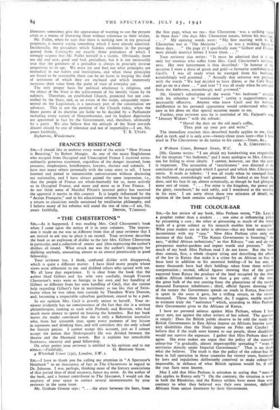Sin,—I have to thank you for calling my attention in
"A Spectator's Notebook" to an inaccuracy of fact m The Chestertons in regard to Dr. Johnson. I was, perhaps, thinking more of the literary associations of that period than of datal accuracy, hence my error. As the author of the book, and a former contributor to The Spectator, I would ask the courtesy of your space to correct several misstatements by your reviewer in the same issue.
Mr. Graham Greene says: ". . . the sneer between the lines, from
the first page, when we rea t that Chesterton 'was a striking tigurt in those days' (the days Mrs. Chesterton means, before his marriage) . . ." My opening words were: "My first meeting with G. K. Chesterton was at The Moderns' . . . he was a striking figure in those days. . . ." On page 27 I specifically state "Gilbert and Frances were already married before I knew them. . . ."
Your reviewer also writes : "It must be admitted that it is not only her enemies who suffer from Mrs. Cecil Chesterton's tasteless- ness. Her own honeymoon is thus described: 'In honour of the occasion I wore a dress of green and gold—a favourite combination of Cecil's. I was all ready when he emerged from his bedroom, astonishingly well groomed. . ." Actually that sentence was prefaced with the words "We had decided to have dinnei at the Café Royal and go on to a show . . ." and later "I was all ready when he emerged from the bathroom, astonishingly well groomed."
Mr. Greene's substitution of the words "his bedroom" coupled with his reference to " tastelessness " carries a suggestiveness un- necessarily offensive. Anyone who knew Cecil and his habitual indifference to his personal appearance would understand what the care in his dress on that special occasion meant to me.
Further, your reviewer says he is reminded of Mr. Farjeon's song "Literary Widows" with the refrain:
"Shovel the dust on the old man's coffin, Then pick up your pen and write."
The immediate reaction thus described hardly applies to me. Cecil died in 1918, and it is only now—twenty-three years later—that I have tried in The Chesterums to do justice to his career.—Yours, &c., [Mr. Greene writes: "I am afraid my handwriting was responsible for the misprint "his bedroom," and I mirst apologise to Mrs. Chester- ton for failing to write clearly. I cannot, however, see that the point is important. The accusation of ' tastelessness ' was directed at the conclusion of the paragraph which I quoted and which Mrs. Chesterton omits. It reads as follows: 'I was all ready when he emerged from the bathroom, astonishingly well groomed. He looked at me from the door, and his face lit up, almost ecstatically, as though he had glimpsed some sort of vision. " . . For mine is the kingdom, the power and the glory, sweetheart," he said softly, and I wondered at the worship in his eyes.' I am sorry about these two mistakes of detail; my opinion of the book remains unchanged."]


























 Previous page
Previous page